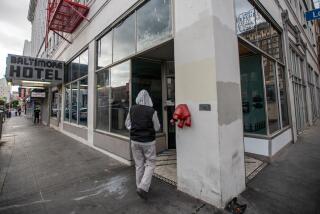KOCE Group Wins Right to Buy
Coast Community College District trustees voted Wednesday to negotiate the sale of KOCE-TV Channel 50 with a group of Orange County civic leaders who have pledged to keep it a public broadcasting affiliate, all but completing the sale of the station.
“I feel like somebody feels at the start of a great journey,” said Joel Slutzky, spokesman for the KOCE-TV Foundation, following the 4-1 vote. “There’s lots of anticipation about what we can accomplish.”
The foundation has offered $32 million, which includes $8 million down and the rest to be secured by a note. The trustees will meet Dec. 10 to vote on the final deal.
The meeting was not without contention. A two-trustee screening committee had disqualified a bid by Almavision Hispanic Network, saying it had not shown the financial wherewithal.
“We have a check for $35 million,” Juan Bruno Caamano, president of the Spanish-language Christian Network, told trustees Wednesday night. “Do you want to sell or don’t you? So what is your answer?”
He got none.
“You’d better be careful,” he said as he left the microphone to cheering from his supporters, some of them carrying signs. In an interview later, he said: “I’d like more respect for my bidding.”
Other audience members held placards supporting the foundation’s bid, which the screening committee called “the highest responsible offer.”
After saying for weeks that money was not the issue and that they would not increase their bid, foundation officials decided that was exactly what they had to do to secure the license for Orange County’s public TV channel. The foundation raised its bid from the original $10 million, with $1 million down, and the rest to be paid over five years.
Foundation officials have declined to identify the source of its funds, but the proposal has won the support of many of Orange County’s leading educators, politicians and business executives.
One poll by Cal State Fullerton and the Orange County Business Council found that 76% of county residents supported selling the station to a group that would preserve KOCE as a PBS outlet, even if the offer was less than half those from several Christian broadcasters, as was the case after the first round of bids.
Community college trustees said selling the station was necessary to prop up their ailing budget. Some people also said the station, with its $8-million budget, was losing money the district couldn’t afford.
The foundation’s offer was not without its ups and downs. The group started the bidding process by itself, then went into partnership with KCET Channel 28, the Los Angeles PBS station. Late last month, that duo broke up, barely more than two weeks before the community college district was expected to decide.
Both sides said that the decision was amicable and that they expect to work together if the foundation takes over the station. Al Jerome, KCET president and CEO, said his station, with its 50-member board, couldn’t work out details of the deal in time.
Even before then, the bidding was thrown into turmoil when a representative of Trinity Broadcasting Network, the world’s largest religious broadcaster, seemingly told trustees that TBN was throwing its support behind the foundation bid, despite its own $25-million offer.
More than a month later, a TBN spokesman explained that the televangelist organization hoped the foundation would win the station, but if the trustees decided to sell to the highest bidder, it wanted the station for itself.
TBN later dropped out of the bidding, as did LeSEA Broadcasting Corp. of Indiana, which had offered $10 million cash, $15 million in payments and 20% of annual profits. At the end, the bidders were Daystar Television Network of Dallas, the second-largest religious broadcaster in the country, Almavision and Pappas Telecasting Cos.
Those bids were not without complications.
Daystar bid $25.1 million cash and then turned in a $40-million offer a day after the Oct. 8 deadline, which the board refused to accept.
Pappas Telecasting Cos., which owns 20 TV stations, offered $25.1 million cash. The company planned to turn KOCE into what it said would be the first noncommercial Spanish-language station in the country.
But because the Visalia-based company failed to make a first-round offer, the board wouldn’t accept Pappas’ bid.
Harry Pappas, CEO of Pappas Telecasting, read a letter from the district’s broker to bolster his case that his company had been approved to compete for the station and insisted that his all-cash deal was the best one.
Pappas asked the trustees to postpone a decision so he could work out a deal with the foundation.
He said he would let the foundation use one of the several channels KOCE will have available when the station goes digital. He said the foundation would just have to pay programming expenses.
Foundation officials had argued even before their final offer became public that theirs was the highest “net” bid.
They said that if a Christian broadcaster bought the station, the district would incur costs of at least $12 million, including the return of subscriber pledges, repayment of funds to the Corporation for Public Broadcasting and employee severance.
In addition, some people who had donated funds to KOCE said they would sue if the station did not remain a PBS affiliate. Others said they would go to the Federal Communications Commission to try to block the license transfer.
The community college board is braced for a lawsuit that could come from any of the losing bidders.
“We anticipated getting sued” no matter who won the bid, said board President Paul Berger.
More to Read
Sign up for Essential California
The most important California stories and recommendations in your inbox every morning.
You may occasionally receive promotional content from the Los Angeles Times.











